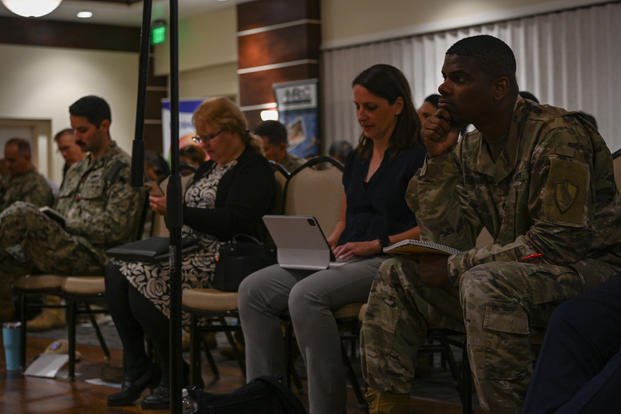Lt. Col. U.S. Army Reserve (Ret.) Janis Nark, who served as an Army nurse in Vietnam and the first Gulf War, transitioned her military training and experience into a successful dual career: She is CEO of her own ski clothing company, and she inspires corporate audiences as a motivational speaker.
"I use my 26 years of military experience, as well as my experience in male-dominated industries like the military and entrepreneurship, to deal with areas of change and stress," she said. She conveys her coping tactics with humor to audiences such as the Air Force, oncology nurses and Toys "R" Us employees.
A certified ski instructor (there's a double black diamond trail named after her on the Aspen Highlands), member of the Veterans Resource Network Association board of directors and a published author, Nark wrote a chapter on "Visualizing Your Life" for a recently released anthology, "Life, Work and Money: From a Woman's Perspective." She talks about how her Army experience helped her become the entrepreneur she is today.
Monster: How have the skills you developed as an Army nurse helped you in the corporate world?
Janis Nark: "I have a tremendous capacity for problem-solving due to being in the military. I was an Army nurse in Vietnam from 1970 to 1971, stationed at Cam Ranh Bay. Then I served in the Army Reserves for 20 years until I was called back to active duty for Operation Desert Storm from 1990 to 1991.
"When you're in the military, you often don't have the means or equipment to do what you need to do. The solution is called 'field expediency.' What have I got that can help me accomplish my mission? That has served me well. In business, you're faced with a multitude of problems every day. When you keep your brain open to many possibilities, you come up with better solutions. There isn't just one answer.
"The other thing is people. You move around a lot in the military, and you might think you won't see people again; that's not true. You'll run into them again later in your career. Don't burn bridges; you may need to cross over them again."
M: How did you successfully transition from working in the very regimented environment of the Army to being your own boss?
JN: "I achieved that transition through what I learned in the Army, surviving a war. Once you go through something as personal and as tragic as the war in Vietnam, when you survive and figure out that you did, your mind says to you, 'There's nothing I can't do.'
"Being in a war gives one an appreciation for how short life can be. It clarifies what's important. What is it you want out of life? You better do it now, because there might not be a tomorrow."
M: What is the key to business success?
JN: "Visualization and tenacity."
M: When you give motivational presentations, what message do you hope to convey to your audiences?
JN: "Change is mandatory, stress is manageable and misery is optional. People are experiencing change and are stressed more than ever before. They're stressed in their personal lives, which carries into their business lives. They're pulled in so many directions that they feel inadequate in all of them.
"I give them very simple ways to deal with change and stress as they're experiencing it. Stress affects the immune system. When people are not eating right and not sleeping and exercising, it's an injury, illness or accident waiting to happen. [I hope to give people] the ability to deal immediately and successfully with change and stress."
M: What advice do you have for vets making the transition into civilian jobs?
JN: "Be humble, because you've had opportunities and learned skills that civilians can't even dream of. Share your wisdom with humility."
Find the Right Veteran Job
Whether you want to polish your resume, find veteran job fairs in your area or connect with employers looking to hire veterans, Military.com can help. Subscribe to Military.com to have job postings, guides and advice, and more delivered directly to your inbox.











